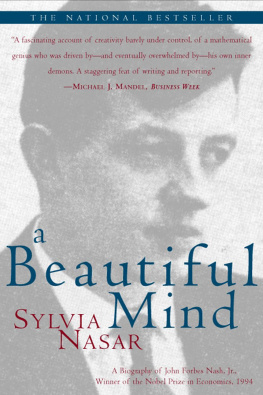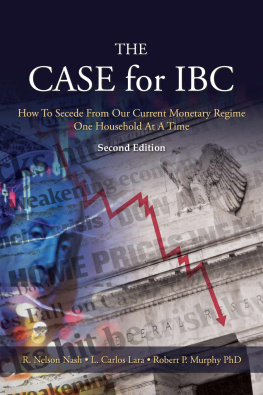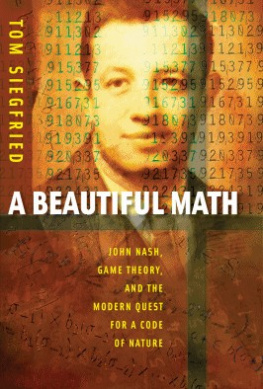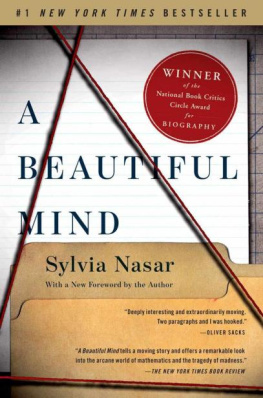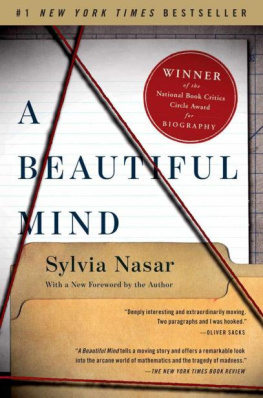W INNER , N ATIONAL B OOK C RITICS C IRCLE A WARD FOR B IOGRAPHY
F INALIST , P ULITZER P RIZE IN B IOGRAPHY
Praise for A Beautiful Mind
Two paragraphs and I was hooked!
Oliver Sacks
A brilliant book.
David Herbert Donald
Reads like a fine novel.
David Goodstein, The New York Times
Powerfully affecting... a three-handkerchief read.
Charles C. Mann, The Wall Street Journal
A triumph of intellectual biography.
Robert Boynton, Newsday
Might be compared to a Rembrandt portrait, filled with somber shadows and radiant light effects... simply a beautiful book.
Marcia Bartusiak, The Boston Globe
A remarkable look into the arcane world of mathematics and the tragedy of madness.
Simon Singh, The New York Times Book Review
A narrative of compelling power.
John Allen Paulos, Los Angeles Times
A wonderfully absorbing puzzle.
Claire Douglas, Washington Post Book World
A poetical love and coming-of-age story.
Ted Anton, Chicago Tribune
The stuff of classic tragedy.
Robert A. Burton, San Jose Mercun News
A powerful story brilliantly told.
Will St. John, Detroit Free Press
A worthy subject and a fascinating book.
Craig Ryan, Portland Oregonian
A page-turner.
Claiborne Smith, Austin Chronicle
An arresting portrait.
June Kinoshita, St. Petersburg Times
The parabolic arc of an American genius... superbly and thrillingly limned.
Will Blythe Mirabella
A staggering feat of writing and reporting.
Michael J. Mandel, BusinessWeek
Profoundly sad yet redemptive.
Worth Magazine
Instead of facile theories, the reader enjoys wonder and astonishment.
Richard Dooling, Salon
Extraordinarily moving.
Jeremy Bernstein, Commentary
Absolutely fascinating.
Jim Holt, Slate
An engrossing, ultimately uplifting book.
Gregg Sapp, Kirkus Reviews
Will touch any reader who understands what it means to hope or to fear.
Booklist
Unique.
The Economist
A compelling book about a phenomenal figure.
Roy Porter, The Times
Unblinking yet empathic.
Daniel Kevles, Times Literan Supplement
A romantic human story.
Steven McCaffery, Irish News
Genuinely compulsive.
Jon Oberlander, Sunday Herald
An astonishing achievement.
Brian Rotman, London Review of Books
A masterpiece of oral history.
Karl Sigmund, Nature
Be prepared for the birth of a new culture hero.
Peter Wilhelm, Business Day
I defy anyone to read Sylvia Nasars prologue without being moved.
Christopher Beauman, Broadway Ham & High
A magnificent biography.
Roy Weintraub, Journal of the History of Economic Thought
High drama.
Wade Roush, MIT Technology Review
Deeply moving.
Paul Trachtman, Smithsonian Magazine
Presented with grace and skill.
Brian Hayes, The Sciences
A must-read with something for everyone.
Keith Devlin, New Scientist
Fascinating, complicated, and studious.
Mark H. Fleisher, JAMA
A deeply moving love story, an account of the centrality of human relationships.
Richard Wyatt and Kay Jamison, The New England Journal of Medicine
A gripping narrative.
Kenneth Arrow, Nobel Laureate, The Times Higher Education Supplement
Thank you for downloading this Simon & Schuster eBook.
Join our mailing list and get updates on new releases, deals, bonus content and other great books from Simon & Schuster.
C LICK H ERE T O S IGN U P
or visit us online to sign up at
eBookNews.SimonandSchuster.com
Contents
F OR A LICIA E STHER L ARDE N ASH
Another race hath been, and other palms are won.
Thanks to the human heart by which we live,
Thanks to its tenderness, its joys, and fears,
To me the meanest flower that blows can give
Thoughts that do often lie too deep for tears.
W ILLIAM W ORDSWORTH ,
Intimations of Immortality
Foreword
(Adapted from remarks at John Nashs 80th birthday Festschrift)
I N J UNE 2006, I went to St. Petersburg to track down the forty-year-old mathematician who had solved the Poincar Conjecture. Reputedly a hermit with wild hair and long nails who lived in the woods on mushrooms, he was up for a Fields Medal and a $1 million cash prize but had gone into hiding, not just from the media but from the math community. Meanwhile, some folks in Beijing were claiming that theyd beaten him to the punch. It was a great storyif only we could find him.
After four frustrating days in Russia, my colleague and I hadnt found a soul who had seen or talked to the guy or his family in years. Then, when we had pretty much thrown in the towel, we stumbled on his mothers apartment more or less by accident and, voil, there was the hermit, dressed in a sports jacket and Italian loafers, evidently having lunch and watching soccer on TV.
He gestured for us to sit down and explain what we wanted.
My name is Sylvia Nasar, I began. Im a journalist from New York and Im working on...
He interrupted: Youre a writer?
I nodded.
I didnt read the book, he said, but I saw the movie with Russell Crowe.
The point is that, no matter where in the world you are, youd have to be a real hermit not to know the inspiring story of John Nash.
There are lots of stories about the rise and fall of remarkable individuals. But there are very few stories, much less true stories, with a genuine third act. Nashs story hadhassuch a third act. Act III of Nashs life story is his miraculous reawakening.
It is that third act that makes Nashs story resonate with people all over the worldmost especially with those who suffer from devastating mental illnesses or love someone who does.
At one point in the movie, when it looks as if things were all over for Nash, his wife, Alicia, takes Johns hand, places it over her heart, and says, I have to believe that something extraordinary is possible.
Something extraordinary was possible.
Of all the letters Ive received from readers, my favorite came from a homeless man. It arrived in a dirty envelope with no return address, and it was scrawled on neon orange paper. It was signed Berkeley Baby. It would never have made it past the New York Times mailroom after the anthrax scare.
The letter writer turned out to have been the night rewrite editor on the metro desk at the New York Times before he was diagnosed with paranoid schizophrenia in the mid-1970s. Since then, he had adopted the name Berkeley Baby and lived on the streets of Berkeley, California, near the university, a forlorn, sad figure not unlike the Phantom of Fine Hall.
He wrote, John Nashs story gives me hope that one day the world will come back to me too.
The world came back to John Nash after more than thirty years, and it was the third act of his life that drew me to his story in the first place. In the early 1990s, I was an economics reporter at the New York Times . I was interviewing a Princeton professor about some trade statistics when he mentioned a rumor that a crazy mathematician who hung around the math building might be on the short list for a Nobel prize in economics. You dont mean the Nash of the Nash equilibrium? I asked. He told me to call a couple of people in the math department to learn more. By the time I put down the phone, I realized that this was a fairy tale, Greek myth, and Shakespearean tragedy rolled into one.
I didnt write the story immediately. Lots of people wind up on short lists for the Nobel and never win, so writing about him in a newspaper would have been an invasion of privacy. In any case, someone else got the prize in 1993. The next year, however, I saw Nashs name in the Nobel announcement. I ran over to my editor to pitch the story and actually made him cry.
Next page
